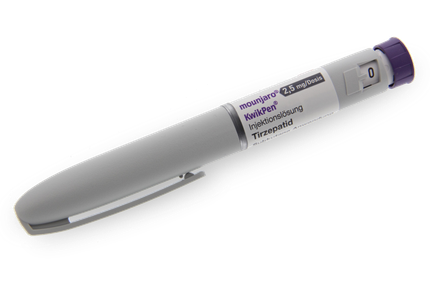Weight loss medication during menopause – what works for you?
During menopause, your body undergoes changes – sometimes more rapidly than you can adapt to. Where previously eating a little less or walking more yielded results, the weight now seems immovable. It’s frustrating because you’re putting in so much effort. Many women find that losing weight becomes increasingly difficult during this stage of life. Your hormones play a larger role in this than you might expect. Fortunately, there are ways to better understand your body – and to support it effectively.

I tried everything, but the scales wouldn’t shift. Thanks to weight loss medication, I finally regained control over my weight – and my confidence.

On this page, you’ll learn what weight loss medication can do for you. We explain how it works, when it might be worth considering, and what options are available. This will help you make an informed decision about what best suits your situation.
Why is losing weight during menopause so difficult?
Your oestrogen and progesterone levels gradually decline, with oestrogen levels fluctuating significantly during this phase – and this has a greater impact on your weight than many women realise:
- Fat storage shifts primarily to the abdominal area.
- Your metabolism slows down, meaning you burn fewer calories at rest.
- Your muscle mass decreases, and muscles are essential for burning calories.
- Your satiety signals may weaken, possibly because your body becomes less sensitive to the hormone leptin.
- Your blood sugar levels fluctuate more, which can lead to increased hunger or cravings.
The result? You’re doing much the same as before, but you’re gaining weight or unable to lose it. It’s not your fault – your hormones are influencing how your body responds.
Healthy nutrition, exercise, and relaxation remain the foundation
Your body has changed, but you’re still in control. A healthy lifestyle remains the foundation for everything – even if you decide to use weight loss medication.
What really helps?
- Proteins and fibre provide satiety and help preserve your muscle mass.
- Healthy fats supply building blocks for the production of hormones like oestrogen and progesterone.
- Avoid fast sugars, which cause spikes and dips in your energy and appetite.
- Sleep is essential – too little sleep disrupts your hunger and satiety hormones.
- Relaxation is just as important as exercise. Stress makes losing weight more difficult.
Weight loss medication can provide additional support, but it’s never a substitute for taking good care of yourself. Think of it not as a “quick fix,” but as part of a broader approach that works in harmony with your body.
When is weight loss medication a good solution?
Sometimes, you do everything “right”: you eat healthily, exercise, and try to find enough relaxation – yet the number on the scales keeps rising. Or you just can’t seem to lose weight, no matter how hard you try. If this sounds familiar, you’re not alone. Weight loss medication can be a valuable support in such cases. These medications help your body manage hunger, satiety, or fat absorption differently – creating an opportunity to see progress in your weight, especially when previous efforts haven’t worked.
Doctors generally follow these guidelines:
- A BMI of 30 or higher, or
- A BMI of 27 or higher combined with risk factors such as high blood pressure, type 2 diabetes, or elevated cholesterol.
Additionally, a doctor will always consider the bigger picture: your lifestyle, medical history, any menopausal symptoms, and your personal preferences. What works for one person may not be suitable for another.
When is weight loss medication not suitable?
Weight loss medication isn’t the right step for everyone. In the following situations, it’s important to seek proper medical advice first or avoid using it altogether:
- During pregnancy or breastfeeding
- If you have certain conditions, such as eating disorders, severe psychological issues, or liver problems
- If you’re taking medications that may interact with weight loss medication
- It’s best not to start on your own initiative. By discussing it with a doctor, you can use it safely and increase your chances of achieving good results.
Not sure if weight loss medication is right for your situation? Talk to a doctor. This way, you can be confident that you’re choosing a safe and suitable solution.
Product comparison
Compare the mechanism of action, usage, and average weight loss across the weight loss products.
What types of weight loss medication are there and how do you use them?
Weight loss medication works in different ways: it can suppress your appetite, stabilise your blood sugar levels, or reduce fat absorption. What suits you depends on your goals, your body, and your preference for a form of administration, such as capsules or injections. Below are the main categories, including examples and how to use them.
Appetite suppressants and satiety enhancers
- How they work: Influence hunger and satiety signals in your brain.
- Form of administration: Often injections (such as Wegovy).
- Suitable for: Those who tend to eat in response to stress or emotions.
Blood sugar-regulating medication
- How they work: Stabilise glucose levels and reduce appetite and energy dips.
- Form of administration: Injections or sometimes capsules.
- Suitable for: Those with cravings, fluctuating energy, or insulin resistance.
Fat absorption inhibitors
- How they work: Partially block the absorption of fat in the intestines.
- Form of administration: Capsules (such as Orlistat).
- Suitable for: Those who prefer not to use injections and follow a low-fat diet.
Combination medications affecting mood and appetite
- How they work: Help with emotional eating and cravings via neurotransmitters.
- Form of administration: Tablets (such as Mysimba).
- Suitable for: Those prone to comfort eating or with addictive tendencies.
These medications also differ in form of administration (injection or tablet), frequency of use, and whether or not a prescription is required.
Explore our range of weight loss medication
The weight loss medication that suits you depends on various factors: your weight, your health, menopausal symptoms, and your personal preferences. Our collaborating doctors are happy to assist you in making the right choice.
On the product page, you will find an overview of weight loss medication specifically tailored to women dealing with weight gain. This selection is based on effectiveness, evidence, and user experience. For each product, you can read how it works, who it is suitable for, and what you can expect.
Can hormone therapy help with weight loss?
Hormone therapy (HRT) is primarily used to relieve menopausal symptoms, such as hot flushes or mood swings. However, it can also have an indirect effect on your weight. Oestrogen helps with a more favourable fat distribution and muscle retention, often making you feel more energetic and improving sleep—factors that together can contribute to weight management.
Note: HRT is not a weight loss medication. Whether it is suitable for you depends on your medical history and symptoms. Always discuss this with one of our collaborating doctors.
Your path to a smooth menopause starts here
Get the tools you need to navigate menopause with more ease and to educate yourself about your body. With tips and insights from experts, and relatable stories of women just like you. Press play, not pause.


FAQ
Is weight loss medication safe during menopause?
For many women, weight loss medication is safe, provided it is prescribed or recommended by a doctor. Not every medication is suitable for every situation, so consultation is always important.
Can I start without a prescription?
Some medications, such as Orlistat, are available without a prescription. However, it is wise to discuss your options with a doctor—especially if you have other symptoms or are taking other medications.
What if I experience side effects?
Do not stop abruptly. Contact the doctor who is guiding you. Sometimes a lower dosage or a different medication may be more suitable for your body.

22-04-2025











